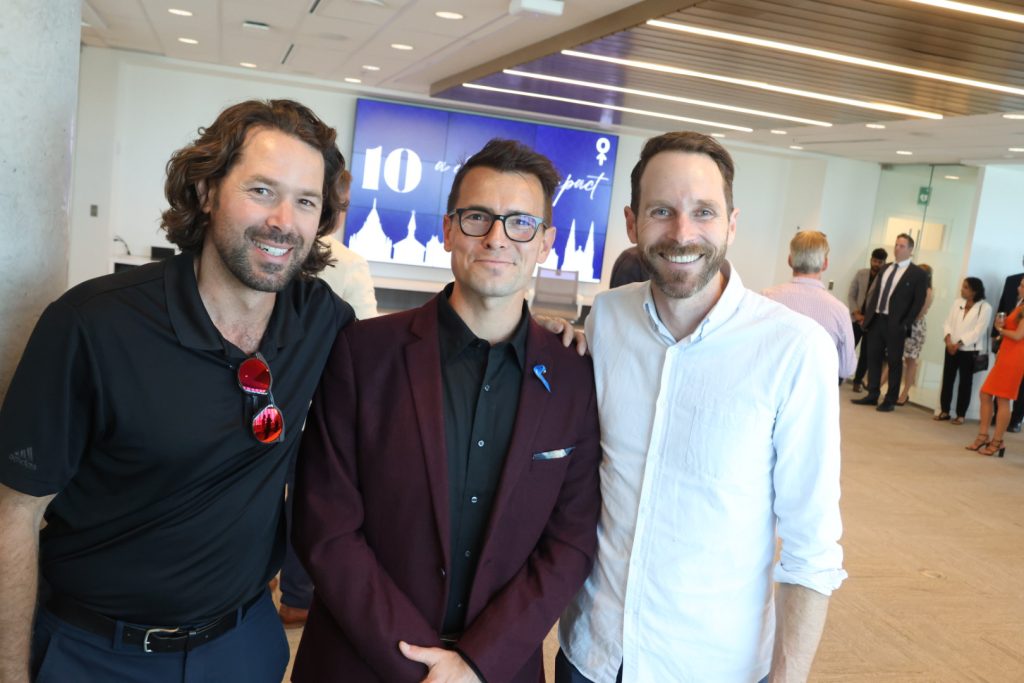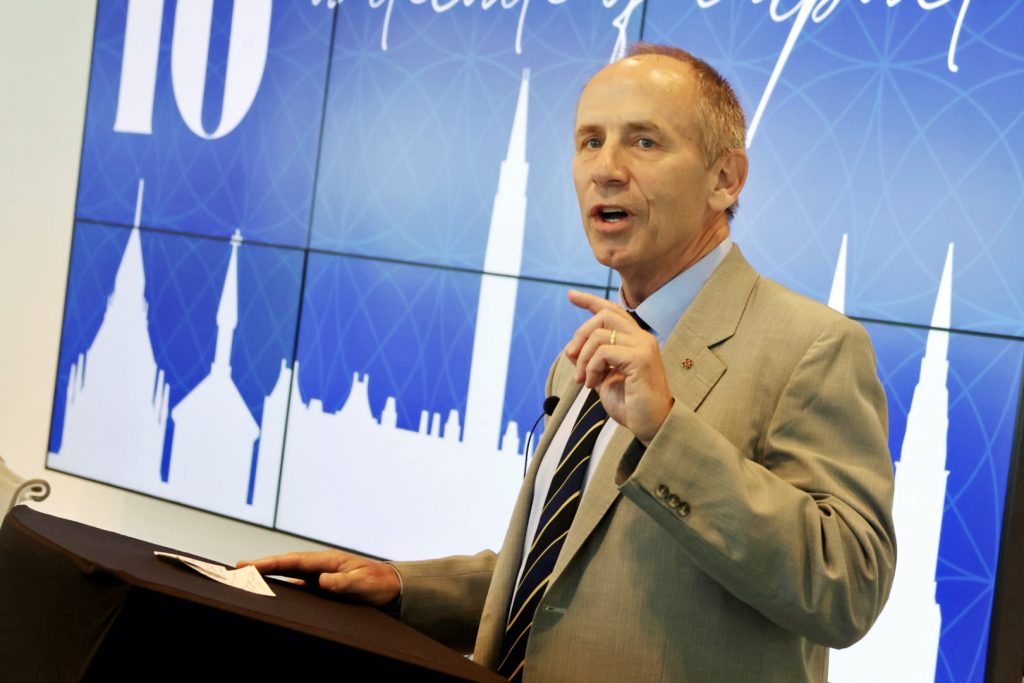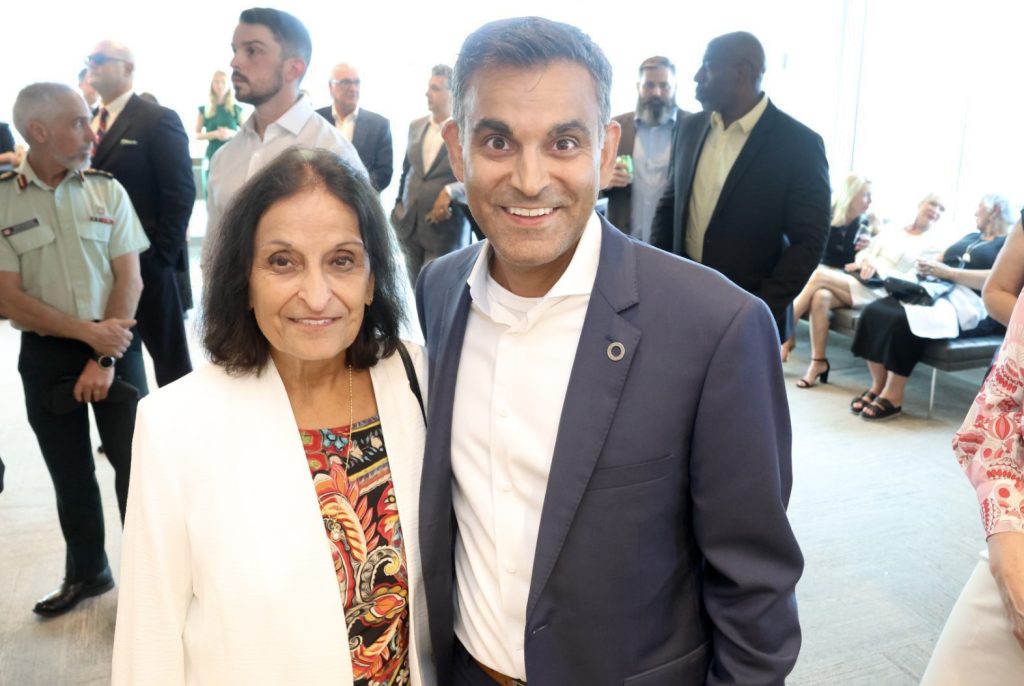Our brains are our prized ally and, yet, they can take a beating, be it on the battlefield or sports arena.
That’s why leaders in sports, military and governance came together in support of Concussion Legacy Foundation Canada (CLFC), a non-profit organization founded in late 2012 by Harvard graduate and four-time Grey Cup champion Tim Fleiszer to help solve the concussion crisis.
The invite-only reception, called A Decade of Impact, was held Tuesday at KPMG’s Ottawa office, up on the 18th floor of Performance Court at 150 Elgin St. It’s a beautiful space that overlooks our downtown landscape. The keynote speaker was Hockey Hall of Famer Ken Dryden, who won six Stanley Cups while goalie for the Montreal Canadiens in the 1970s.

As well, guests heard from Denis Thompson, a retired major general with the Canadian Armed Forces and current board member with CLFC, and from local MPP Lisa MacLeod. She spoke about her work to help create Rowan’s Law in support of concussion safety following the death of one of her constituents, 17-year-old Rowan Stringer, from multiple concussions suffered while playing high school rugby. The girl had dreams of becoming a pediatric nurse at CHEO. “This is a real-life story; this isn’t theoretical,” said MacLeod of Stringer’s passing on Mother’s Day in 2013. “This is a story about a child in my community that would have turned 27 this year.”
Attendees included federal Sports Minister Pascale St-Onge and four-time Olympic medallist paddler Adam van Koeverden, who’s now a Member of Parliament and parliamentary secretary to the Minister of Health and to the Minister of Sport.
Also from the sports world were former Ottawa Senators player Cody Ceci (now with the Edmonton Oilers), former Olympic skiers Patrick Biggs, executive director of Alpine Ontario, and Ryan Semple, director of business development for Avenue 31, as well as former Ottawa Rough Rider and Ottawa Renegade player Darren Joseph.
The event had the support from such businesses as KPMG, represented by one of its partners, Leigh Harris, her husband Jeff Hill from Hill & Associates/BMO Nesbitt Burns, and Darcy Walsh, president of Edelman Global Advisory (Canada). Janice Barresi was there from Ottawa Sports and Entertainment Group, which owns the Ottawa RedBlacks and Ottawa 67’s, while Jacqueline Belsito represented the Ottawa Senators organization.
Fleiszer, who’s executive director of CLFC, was joined by such board members as executive coach, entrepreneur and philanthropist Caroline Desmarais.





It’s been about 12 years since Dryden started writing articles on concussions and brain injuries, predicting that society would one day look back and question how hits to the head in hockey could ever have been allowed. Dryden has had a remarkable career, not only in hockey, but also as a lawyer, politician, businessman and author.
“I wrote about how, when we think back in history … we often notice things that just make no sense. Slavery. How could it ever have existed? How could we ever have believed it was okay? Or women – half of all of humanity not being able to vote. Really? Or residential schools. How could so many people have thought, somehow, they were a good idea? Or tobacco. Or drinking and driving.
“In these articles, I also wrote about how, in thinking back about the people, about the decision-makers of those times, we often say to ourselves, ‘How could they have been so stupid?’ ”
“I mean, really; you hit people in the head again and again, whatever the sport, whatever the activity, you don’t think bad things would happen?”
Scientists have done their part, said Dryden, referring to their findings that repeated head trauma is linked to the brain-withering disease known as chronic traumatic encephalopathy (CTE). Canadiens legend Henri Richard, who passed away in 2020 at age 84, was posthumously diagnosed with CTE, his family publicly shared last week.
In his remarks, Dryden called for action from decision-makers in the areas of sports, government and business.
“Concussions and brain injuries are not death and taxes; they are not inevitable. Sure, some will happen; real accidents do and always will happen, but the number of concussions and brain injuries can be reduced significantly, substantially. This is absolutely doable, and doable in a way that, when the right changes are introduced, the game is still the game. Hockey is still hockey.”
Thompson, who served 39 years in the Canadian Army and was deployed on multiple operations at home and abroad (including in Bosnia and Afghanistan), spoke about his strong belief in the work that’s being done by Concussion Legacy Foundation Canada to better understand how to prevent and treat brain injuries for both men and women. He was joined at the event by the CAF’s surgeon general, Maj.-Gen. Marc Bilodeau, and CANSOFCOM Command Chief Warrant Officer Gary Grant.
“One of things I’ve been asked is, what do I think about academics and scientists studying brain injuries,” said Thompson. “Is this just a whole bunch of eggheads that are weak-kneed and don’t know how to tell somebody to get a backbone and get back in the fight?”
As far back as ancient Greece and Rome, warriors wore helmets to protect themselves, he pointed out. “The head houses the brain, and the brain is where all things happen,” said Thompson. “Nevertheless, frequently when somebody is knocked in the head and gets their bell rung, as we put it, we just tell them to get on with it, as commanders.”
This has to change, he said. “Today’s science indicates to us that ‘suck it up, buttercup’ is no longer a working strategy.”

Fleiszer talked about his love of sports and the positive influence they’ve had on his life. “My greatest memories, friendship and experiences are tied to sports participation,” said Fleiszer, who played with the Tiger-Cats, Alouettes, former Ottawa Renegades, Eskimos (now the Elks) and Saskatchewan Roughriders.
“I learned to play with teammates from much different backgrounds. I learned I can accomplish so much more working with others than I ever could on my own. I learned how to give every ounce of my heart for a cause and to never quit, no matter what.”
Fleiszer also became an expert at exercise, nutrition, hydration, sleep, overall health, and how to rehabilitate his injuries. “Sports has given me the opportunity to travel internationally, to learn to perform under intense pressure and become better by practising a skill, over and over and over again.”

The married father of three young boys spoke about the role that parents have in keeping their children safe from sports that can cause brain trauma. He shared some sobering reports, including the finding that an NHL player who starts tackle football at age five will have 10 times the odds of developing CTE than if he had started at 14. Another study out of CHEO Research Institute, involving nearly 500,000 children and youth, found young people who suffer a concussion are at 40 per cent higher risk of mental health issues compared to those who suffer an orthopedic injury, he said.
“Having young children bodychecked, tackled or heading soccer balls exposes them to unnecessary risk,” said Fleiszer. “There’s been so much talk about proving this scientifically beyond any doubt before we change the way that children play sports. As a parent, I see it the other way … you need to prove to me scientifically without a doubt that these activities won’t cause them brain damage and expose them to dementia, mental health issues and other terrible outcomes.”
Properly addressing the issue, said Fleiszer, “doesn’t need a 10-year plan, 100 million dollars or the development of cutting-edge technology. We need to change a few rules in the games that our kids play. It’s that simple.”
Retired master warrant officer Sushma Vasdev, who talked with Fleiszer about her service in the Canadian Armed Forces, attended with her son, Dr. Neil Vasdev, director at the CAMH Research Imaging Centre and the Azrieli Centre for Neuro-Radiochemistry. He and his colleagues are exploring the progression of traumatic brain injuries through brain imaging in patients.







caroline@obj.ca





